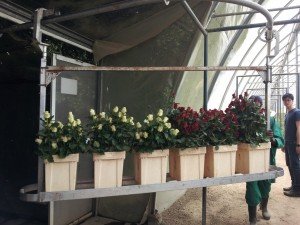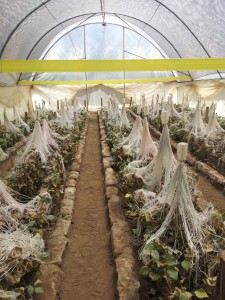One thing is to know that the agricultural business represents roughly 50% of Kenya’s GDP (including indirect contributions), and another thing is to observe how this is created. Last week I joined a group of IESE MBA students in their visit to two companies in this industry: Vegpro, and Kreative Roses. Both of them quite impressive!

Kreative Roses is a focused company that grows and exports roses. Vegpro is more diversified (and also larger): They export both processed fresh veggies and flowers, and they just acquired a sugarcane farm in Tanzania.
Selling perishable products, their logistics are challenging:
- Vegpro processing facilities are located in the Nairobi airport area. The airlines appreciate their business, as Vegpro contributes filling their planes regularly and all year long. This means that when the planes deviate due to weather conditions, and the cargo needs to be re-routed, Vegpro’s products receive priority treatment.
- Kreative Roses’ farm is in the Lake Naivasha area, about 100 km. away from Nairobi. But they are located next to a logistics operator to whom they outsource logistics.

Interestingly, neither of these companies utilizes insecticides. Instead, they control plagues by growing local insects that eliminate the pests.
SMEs like these are not the full picture of the Kenyan agricultural industry. A large number of small, traditional farmers contribute serving domestic needs. In fact agriculture employs more than 75% of the workforce. However, most of these farmers lack basic agricultural inputs and work with outdated technology, and the domestic demand is underserved.
And a striking situation: while food is being exported to the Western world, 35% of children under five are stunted and 16% are underweight. Isn’t this food for thought?


Hi Africa, I am an enthusiastic of Africa’s development. I follow your blog and I wonder if really would make sense to help this agricultural enterprises in lean processes to improve quality, lead time, and finally benefits. I would appreciate your comments.
I write in a weekly basis different articles about Afrcia. More than 50 countries give a lot of oportunities in a continent on the move.
Hi Jose Pedro, yes, I think there are plenty of opportunities to contribute improving the efficiency of small agricultutral enterprises across the continent. While in Nigeria, I visited a tomato farm run by an entrepreneur whose aim is to “industrialize” the production of tomatoes by introducing method improvements and aggregating volumes from other local producers. Small improvements (like in the way the tomatoes are packaged and transported) can make important differences. There’s plenty of opportunities as well in food processing.
What’s the difficulty? That small farmers are driven by the immediate results. Last week I met the management team of an important Kenyan company that provides high quality products to increase farm productivity (e.g., fertilizers, cattle vaccines, etc.). They explained to me that they have a difficult time in communicating to the farmers productivity improvements that can only be appreciated after one month or so: unless they see the effects in one or two days, they are not willing to pay for the price differential of the company’s products.
Where do you write your articles about Africa? Are they publicly available? It would be great if you can share this us. And thanks for following the blog!
Africa, it sounds interesting your point. I will think about it. I had the opportunity to visit several times South Africa when I was in Automotive industry. My company had a subsidiary in Cape Town and I was Project owner for a GM car at that time that it would be produced in GM Assembly Plant for the hand drive version. Since that moment I started with interest the development of that Continent and I wrote my first article in 2010 (https://www.bluesteps.com/blog/emerging-markets-invest-in-africa.aspx)
I have just started few weeks ago to write again. At this time in Linkedln but if possible I would like to create a blog. If you need my support do not hesitate to let me know it. Keep in contact.
Thank you, Jose Pedro!
I intend to start circulating my posts through Linkedin soon — any support from your side is much appreciated!